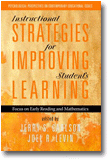
Instructional Strategies for Improving Students' Learning
Focus on Early Reading and Mathematics
Edited by:
Jerry Carlson, University of California - Riverside
Joel R. Levin, University of Arizona
A volume in the series: Psychological Perspectives on Contemporary Educational Issues. Editor(s): Jonathan Plucker, Johns Hopkins University.
Published 2012
The twin objectives of the series Psychological Perspectives on Contemporary Educational Issues are: (1) to identify issues in education that are relevant to professional educators and researchers; and (2) to address those issues from research and theory in educational psychology, psychology, and related disciplines.
The present volume, consisting of two focal chapters, commentaries, and final responses targets instructional strategies for improving students’ learning in two of the traditional “three R” areas, reading and ′rithmetic (mathematics), in the elementary school grades. The focal chapters in those two skill areas are written by leading contributors to the reading and mathematics research literatures, Cathy Collins Block for the reading section and Douglas Clements and Julie Sarama for the mathematics section. Few would dispute the essentiality of these two curricular domains in laying the foundation for the development of students’ competencies in a vast array of academic disciplines in both the in- and out-of-school years that lie ahead.
The present volume is intended for practitioners and researchers who are seeking the latest instructional research-based strategies for improving students’ early reading and mathematics performance.
CONTENTS
Editors’ Introduction. SECTION 1: READING INSTRUCTIONAL STRATEGIES. Proven and Promising Reading Instruction: What We Know and What Works, Cathy Collins Block. Proven and Promising: The Eye of the Beholder? Rollanda Estby O’Connor. Reflections on What’s Proven and Where the Promise Lies, Margaret G. McKeown. Good Intentions and Unexpected Consequences: The Case of Reading Fluency, James F. Baumann. Understanding Reading Research from Different Sociocultural Historical Contexts, Virginia W. Berninger. From Proven and Promising Reading Instruction to Paving New Paths: Widening Highways, Crossing Borders, and Repairing Potholes, Cathy Collins Block. SECTION 2: MATHEMATICS INSTRUCTIONAL STRATEGIES. Learning and Teaching Early and Elementary Mathematics, Douglas H. Clements and Julie Sarama. Comments on Learning and Teaching Early and Elementary Mathematics, Arthur J. Baroody, David J. Purpura, and Erin E. Reid. The Common Core Mathematics Standards as Supports for Learning and Teaching Early and Elementary Mathematics, Karen C. Fuson. You Can’t Play 20 Questions with Mathematics Teaching and Learning, and Win, James W. Stigler and Belinda J. Thompson. Learning Trajectories Through a Sociocultural Lens, Anita A. Wager and Thomas P. Carpenter. Walking the Same Broad Path (with Side Trips): Response to Comments, Julie Sarama and Douglas H. Clements. About the Editors.
-
Paperback978-1-61735-629-2
Web price: $45.04 (Reg. 52.99)
-
Hardcover978-1-61735-630-8
Web price: $80.74 (Reg. 94.99)
- eBook9781617356315

- EDU010000 - EDUCATION: Elementary
- EDU029000 - EDUCATION: TEACHING METHODS & MATERIALS: General
- EDU037000 - EDUCATION: Research
-
 (Re)Envisioning Social Studies Education Research
Current Epistemological and Methodological Expansions, Deconstructions, and Creations
(Re)Envisioning Social Studies Education Research
Current Epistemological and Methodological Expansions, Deconstructions, and Creations
-
 Cultivating Democratic Literacy Through the Arts
Guiding Preservice Teachers Towards Innovative Learning Spaces in ELA Classrooms
Cultivating Democratic Literacy Through the Arts
Guiding Preservice Teachers Towards Innovative Learning Spaces in ELA Classrooms
-
 Educating the Evolved Mind
Conceptual Foundations for an Evolutionary Educational Psychology
Educating the Evolved Mind
Conceptual Foundations for an Evolutionary Educational Psychology
-
 Exploding the Castle
Rethinking How Video Games & Game Mechanics Can Shape the Future of Education
Exploding the Castle
Rethinking How Video Games & Game Mechanics Can Shape the Future of Education
-
 Qualitative Research With Diverse and Underserved Communities
Qualitative Research With Diverse and Underserved Communities
-
 Structured Discovery Cane Travel Approach to Orientation and Mobility Concepts
Structured Discovery Cane Travel Approach to Orientation and Mobility Concepts
-
 The Case of the No Child Left Behind Legislation
Educational Research and Federal Funding
The Case of the No Child Left Behind Legislation
Educational Research and Federal Funding

